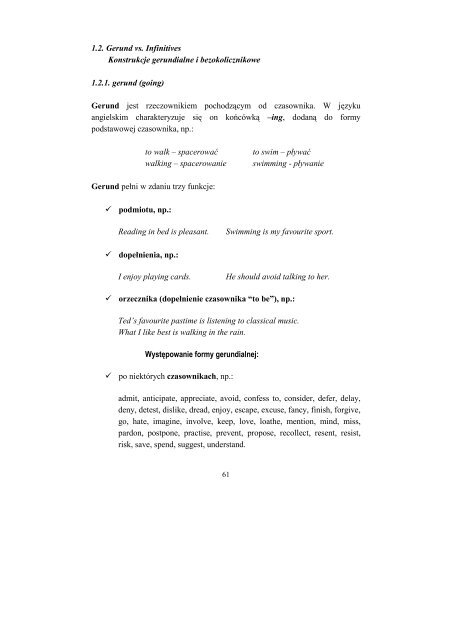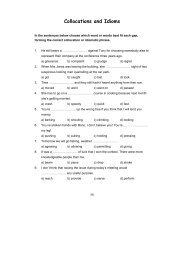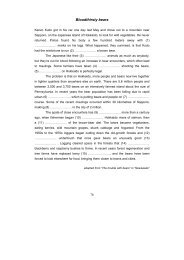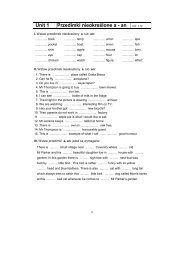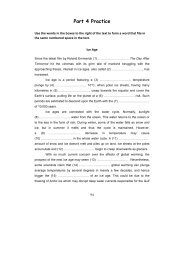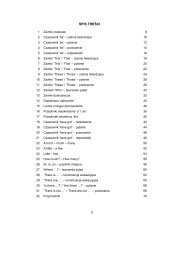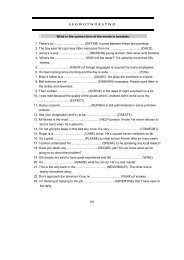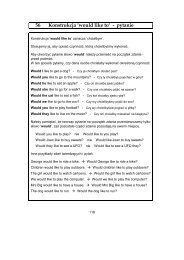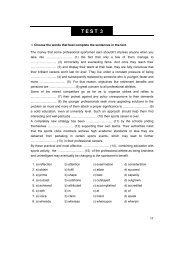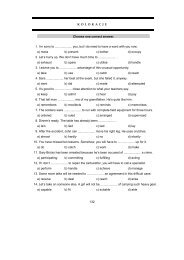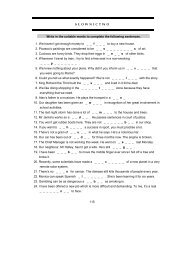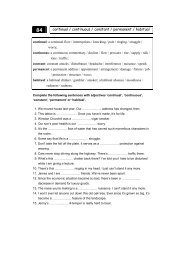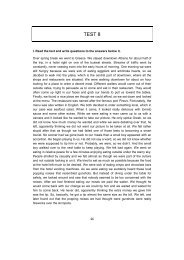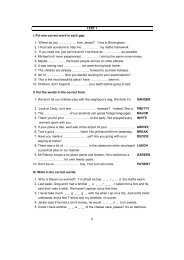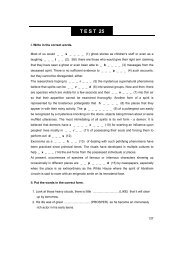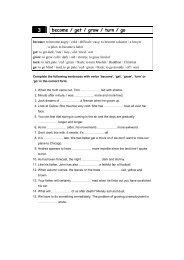Przykładowe strony 2 - HandyBooks
Przykładowe strony 2 - HandyBooks
Przykładowe strony 2 - HandyBooks
Create successful ePaper yourself
Turn your PDF publications into a flip-book with our unique Google optimized e-Paper software.
1.2. Gerund vs. Infinitives<br />
Konstrukcje gerundialne i bezokolicznikowe<br />
1.2.1. gerund (going)<br />
Gerund jest rzeczownikiem pochodzącym od czasownika. W języku<br />
angielskim charakteryzuje się on końcówką –ing, dodaną do formy<br />
podstawowej czasownika, np.:<br />
to walk – spacerować<br />
walking – spacerowanie<br />
to swim – pływać<br />
swimming - pływanie<br />
Gerund pełni w zdaniu trzy funkcje:<br />
podmiotu, np.:<br />
Reading in bed is pleasant.<br />
Swimming is my favourite sport.<br />
dopełnienia, np.:<br />
I enjoy playing cards.<br />
He should avoid talking to her.<br />
orzecznika (dopełnienie czasownika “to be”), np.:<br />
Ted’s favourite pastime is listening to classical music.<br />
What I like best is walking in the rain.<br />
Występowanie formy gerundialnej:<br />
po niektórych czasownikach, np.:<br />
admit, anticipate, appreciate, avoid, confess to, consider, defer, delay,<br />
deny, detest, dislike, dread, enjoy, escape, excuse, fancy, finish, forgive,<br />
go, hate, imagine, involve, keep, love, loathe, mention, mind, miss,<br />
pardon, postpone, practise, prevent, propose, recollect, resent, resist,<br />
risk, save, spend, suggest, understand.<br />
61
po przyimkach i zwrotach przyimkowych, np.:<br />
Are you keen on playing volleyball<br />
She succeeded in getting the job.<br />
po niektórych zwrotach i wyraŜeniach, np.:<br />
it’s no use<br />
it’s (not) worth<br />
it’s no good<br />
be busy<br />
what’s the use of…<br />
there’s no point (in)<br />
can’t help<br />
can’t stand<br />
be/get used to<br />
have difficulty (in)<br />
It’s no use learning German.<br />
We couldn’t help laughing.<br />
1.2.2. Infinitives<br />
1.2.2.1. full infinitive (to go)<br />
1. Bezokolicznik poprzedzony partykułą to, moŜe pełnić w zdaniu<br />
funkcję:<br />
podmiotu, np.:<br />
To learn English is an easy task.<br />
dopełnienia, np.:<br />
I am happy to be here with you.<br />
orzecznika, np.:<br />
Her plan is to have 5 children.<br />
przydawki, np.:<br />
Tom was the first to get up.<br />
okolicznika celu, np.:<br />
He visited them to tell them about the death of their grandmother.<br />
62
Występowanie formy Full Infinitive:<br />
po niektórych czasownikach, np.:<br />
agree, aim, appear, arrange, ask, attempt, bother, care, choose, claim,<br />
consent, decide, decline, demand, determine, endeavour, fail, guarantee,<br />
happen, hesitate, hope, learn, long, manage, neglect, offer, plan,<br />
prepare, pretend, proceed, promise, prove, refuse, resolve, seem, swear,<br />
tend, threaten, urge, volunteer, vow.<br />
po przymiotnikach (*wyjątek: busy, worth ), np.:<br />
I was annoyed to hear that she had died.<br />
po it + be + przymiotnik + of, np.:<br />
It was kind of him to welcome us.<br />
po too i enough, np.:<br />
She is too short to play basketball.<br />
She is responsible enough to go there.<br />
po only, np.:<br />
She rushed to school only to learn that she had failed the exam.<br />
po who, what, where, how, when, np.:<br />
She didn’t know where to go.<br />
what to do.<br />
how to get there.<br />
po be + the first/third/best…etc., np.:<br />
She was the last to come.<br />
po wyraŜeniach: would like/love/hate, would prefer, np.:<br />
They would prefer to stay at home.<br />
63


